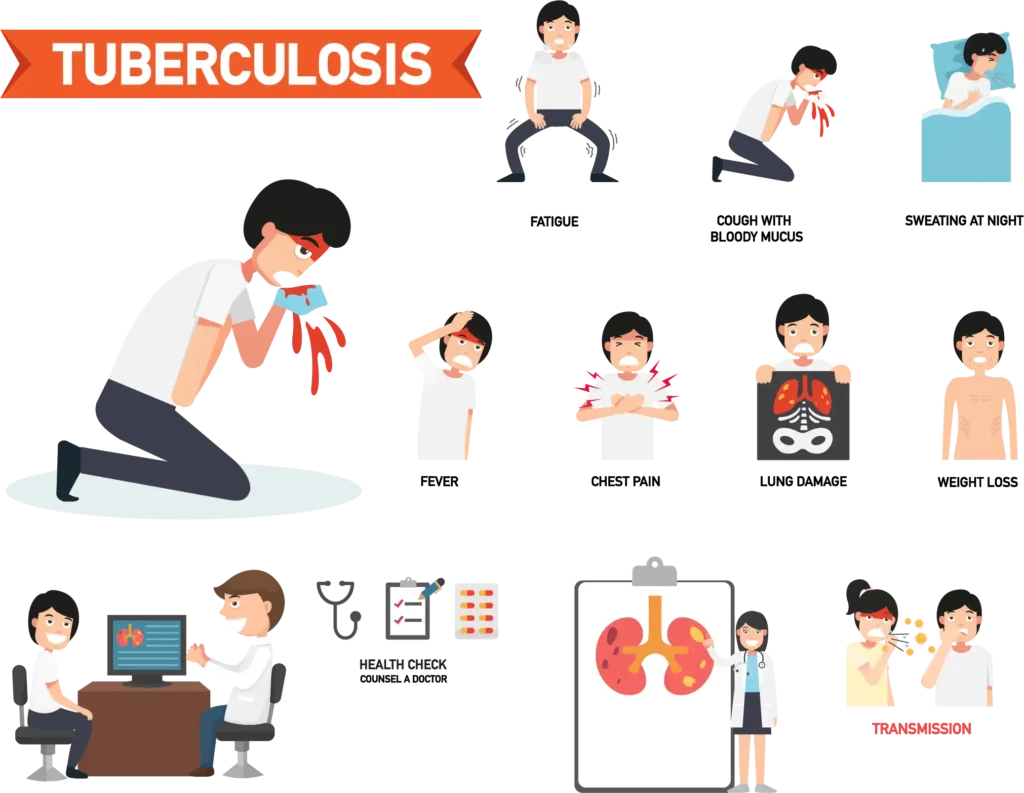Tuberculosis
Learn about Tuberculosis and know about the disease symptoms,causes and more.
What is Tuberculosis?
Tuberculosis, often referred to as TB, is an infectious disease caused by the bacterium Mycobacterium tuberculosis. It primarily affects the lungs but can also affect other parts of the body. Understanding its symptoms, causes, prevention, triggers, and treatment is crucial for managing this condition effectively.

It can vary depending on the stage of the disease. Common symptoms include:
- Persistent coughing
- Coughing up blood
- Chest pain
- Fatigue and weakness
- Fever and night sweats
- Loss of appetite and weight loss
Tuberculosis is caused by the Mycobacterium tuberculosis bacteria. It spreads through the air when an infected person coughs or sneezes, releasing tiny droplets containing the bacteria. Factors like weakened immune systems increase the risk of developing active TB.
Certain factors can trigger the activation of latent TB infection into active TB disease:
- Weakened immune system due to conditions like HIV/AIDS
- Smoking and substance abuse
- Malnutrition
- Diabetes
- Close contact with someone who has active TB
Preventing TB involves several strategies:
- Vaccination: Bacillus Calmette-Guérin (BCG) vaccine can help prevent severe forms of TB in children.
- Good hygiene: Covering your mouth when coughing or sneezing, and proper handwashing can reduce the risk of transmission.
- Avoiding close contact: Limiting contact with people who have active TB can lower the risk of infection.
TB treatment typically involves a combination of antibiotics taken for several months. It’s essential to complete the full course of medication as prescribed by your healthcare provider to prevent drug resistance and recurrence of the disease.
Frequently Asked Questions
TB is spread through the air when an infected person coughs or sneezes, releasing bacteria-containing droplets.
- Yes, TB is contagious, especially when it affects the lungs and is in its active form.
People with weakened immune systems, such as those with HIV/AIDS, are at higher risk, as are individuals living in crowded or unsanitary conditions.
Yes, TB can be cured with a proper course of antibiotics, but it’s essential to complete the full treatment regimen.
Latent TB infection occurs when a person has the TB bacteria in their body but does not have symptoms or feel sick.
TB can be diagnosed through a combination of medical history, physical examination, tuberculin skin test, blood tests, chest X-ray, and sputum tests.
If you experience symptoms of TB, such as persistent coughing, coughing up blood, or unexplained weight loss, you should seek medical attention promptly for diagnosis and treatment.
- TB treatment typically lasts for six to nine months, but it can vary depending on the severity of the infection and the individual’s response to treatment.
Yes, children can get TB, although they are less likely to develop active TB disease compared to adults. However, when children do develop active TB, it can be more severe and progress rapidly if not treated promptly.
Yes, the Bacillus Calmette-Guérin (BCG) vaccine is available and is administered to protect against severe forms of TB, particularly in children.
Yes, smoking can exacerbate TB symptoms such as persistent coughing, shortness of breath, and chest pain. Quitting smoking can help alleviate these symptoms and improve overall lung health.